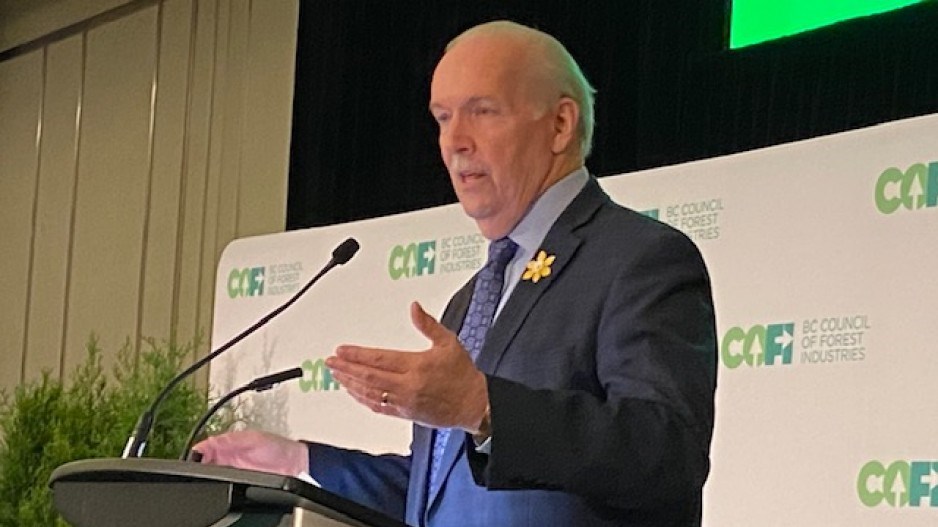Two anti-logging protesters agitating for a total halt to logging old growth forests in B.C. glued and chained themselves to the doors of the JW Marriott Parq Hotel Friday morning, but that didn’t stop Premier John Horgan from getting in for a keynote address to the Council of Forest Industries (COFI) conference.
Despite the Horgan government’s recent decision to remove 1.7 million hectares of old growth from the harvesting land base, anti-logging protesters continue to disrupt traffic with urban pop-up demonstrations and have even doxxed and harassed the very minister responsible for placing vast swaths of old growth off limits to logging.
Earlier this week, it was reported that an activist had publicly released the phone number of B.C. Forests Minister Katrine Conroy, who subsequently was subjected to harassing phone calls at home.
In his address to COFI Friday, Horgan pointed to Western Forest Products (TSX:WEF) and the Huu-ahy-aht First Nation as an example of a successful partnership between industry and First Nations.
The region in which they hold tenure has been the subject of anti-logging protests, despite appeals by the Huu-ay-aht and the Pacheedaht First Nation for the protesters to leave and respect their treaty rights to make their own decisions about how to manage the forests in their territories.
“When I hear people say that they are protecting the lands for rights and title holders, when they glue themselves to roadways in North Vancouver, I say, ‘you haven’t talked to the Pacheedaht. You haven’t talked to Terry Teegee (regional chief for the BC Assembly of First Nations). You haven’t talked to the Huu-ay-aht.’ So do not speak for other people,” Horgan said.
The Huu-ay-aht might have the same thing to say to the provincial government, however. The Huu-ay-aht have dismissed the provincial government’s plans for old growth deferrals in their traditional territories, and were holding their own old growth summit Thursday, parallel to the COFI conference.
The Huu-ay-aht have taken exception to either activists or the provincial government telling them how to manage resources in their traditional territory.
Horgan said forestry was an industry subject to cyclical peaks and valleys, and that the industry needs to prepare for a transition, from higher volume to higher value.
“We are now in one of those peaks,” Horgan said, noting the record profits some forestry companies have been making recently on high lumber prices.
“We all know -- all of us in this room -- that the valley is not far away. What we need to do is to prepare for that transition, and I can’t think of a better time to be preparing for a transition than when we see strong prices for the commodity.”
One of the challenges B.C. faces is a shrinking timber supply, owing to wildfires, the Mountain pine beetle infestation and increased protection of forests for conservation and ecological reasons.
“I don’t want to appear to be tone-deaf on these questions,” Horgan said. “We’re a high-cost jurisdiction. But we are also an extraordinary jurisdiction, with communities and workers and investors and forests that are profoundly important to the rest of the world.
“They may quibble about the costs. But they never quibble about the calibre of the companies and the calibre of the people and the quality of the products.”
Horgan said that for too long forestry policymaking in B.C.left out communities, workers and First Nations.
“As we modernize forestry in British Columbia… we need to do this in a collaborative way,” Horgan said.
Horgan has said the industry needs to do more with less, which means transitioning to a lower volume harvest system and higher value-added manufacturing.
“I have said repeatedly that you need to now focus on more value and less volume,” Horgan said.
“British Columbia’s reputation (for) sustainable forest practices must be front and centre in our minds, and that’s why we’ve been focused as we have with the past number of months with addressing old growth challenges.
“We’re doing that so that we can continue to have the reputation internationally that’s been hard fought, by many in this room, over decades to ensure that those who would criticize forest practices in British Columbia do not have a leg to stand on.”
He added that the desire to protect old growth forests in B.C. is not the sole domain of activists.
“A handful of people who believe they are morally superior to us is not the issue,” he said of anti-logging activists.
“The issue is that British Columbians care about our forests. They’re not all engaging in civil disobedience, they’re not all breaking laws. But they think about forests all the time, and we need to acknowledge that.
“We need to embrace that and say ‘how do we continue to have an industry? How do we continue to have majestic stands where people can come from around the world and marvel at the extraordinary foresight of those who came before us who said, ‘we’re going to protect this area.’”
Despite the fact B.C.’s biggest forestry companies have recently invested more outside of B.C. than in it, Horgan noted some recent investments in B.C., like Canfor’s investment in Prince George to use pulp mill waste to make biofuels. He also pointed to the San Group’s recent investments in the Port Alberni area.
"That speaks to confidence in the people of the region, and it speaks to the confidence in the sector," Horgan said.




